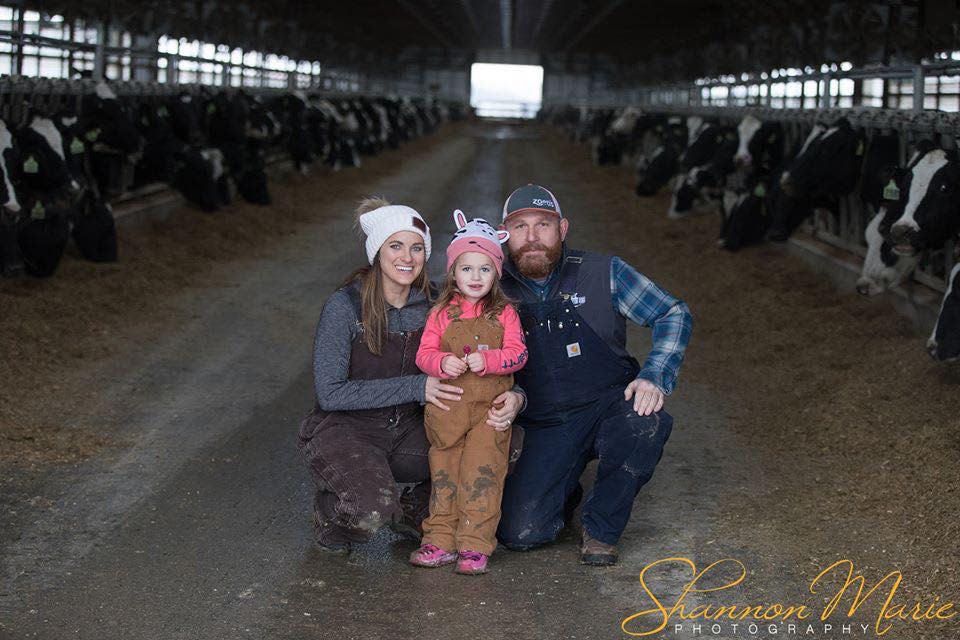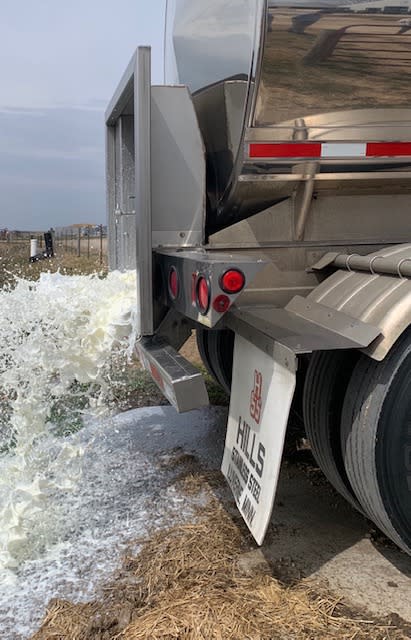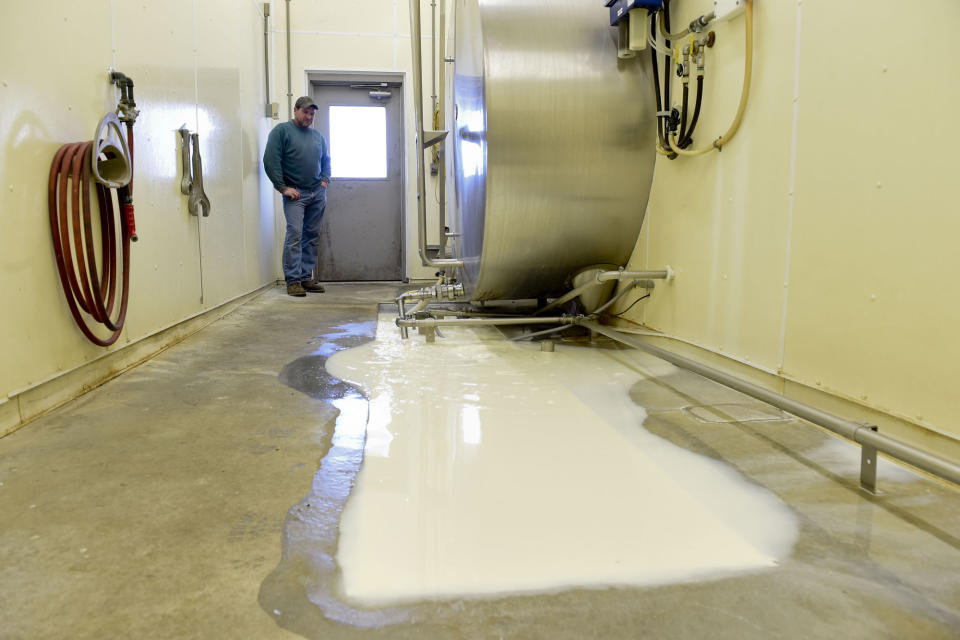'We're in dire need': Food service shutdown slams dairy farmers, producers
Every day, Wisconsin dairy farmers Jim and Katie DiGangi watch more of their life’s work go to waste.
“We’re definitely not sleeping well. It’s devastating,” said Katie DiGangi.
The couple’s families have worked in agriculture for as long as they can remember. They say farming is their family’s passion and its legacy, but the COVID-19 crisis has put it all at risk.
Darlington Ridge Farms produces about 30,000 gallons of milk every day—but it now dumps 12,000-15,000 gallons per day, because food-service demand has dried up. Restaurants, schools and other businesses shuttered by the coronavirus no longer need the milk dairy farms produce.
“Disposing of half of our product —that we have put our blood, sweat and tears into — is extremely heart-wrenching,” said Jim DiGangi in an interview with Yahoo Finance.
As dairy farmers dump massive amounts of milk, warehouses are filling up with cheese that has no place to go.
“We're talking about millions and millions of pounds of cheese that have not been sold because of lost and canceled orders from food service,” said John Umhoefer, executive director of the Wisconsin Cheese Makers Association.

Umhoefer told Yahoo Finance half of all cheese, butter and other dairy products in the United States go to the food-service industry.
“There are whole companies in our industry that are dedicated to just serve the food-service industry — or 75% of their sales or 50% of their sales — and they are finding that all their orders are canceled in food service,” said Umhoefer. “It's unprecedented.”
‘The supply chain is not designed for what’s happening.’
For the DiGangis, one of the most frustrating parts of the situation is that some demand still exists, but the industry can’t meet it.
“Our local grocery stores 10 miles away are limiting butter, milk and cheese purchases and we're over here dumping our milk because the supply chain is not designed for what's happening,” said Katie DiGangi.
“It’s not designed for everybody being at home. We're all cooking at home,” said Jim DiGangi. “So we have the product available. The supply chain — i.e., the processors, the bottlers — [doesn’t] have the tools and the packaging to meet the demands of the retailers.”
Experts say it’s impossible to immediately shift products designed for restaurants to grocery stores. The recipes, the label requirements and the companies that pick up and deliver the products are all different.

“To rebuild all that in a matter of weeks is not possible,” said Umhoefer.
Paul Bauer is CEO of the Ellsworth Cooperative Creamery in Wisconsin, which is made up of about 300 dairy farms. The 110-year-old co-op has two manufacturing plants and a processed cheese plant.
“If you're a blue cheese plant, you make blue cheese. If you're a cheddar manufacturer, you make cheddar,” said Bauer. “There is no way that you can take a mozzarella cheese or a blue cheese plant and suddenly convert them into bottling plants. It just doesn't work that way because they don't have the equipment to bottle it.”
Lawmakers urge USDA to act
Eight members of the Wisconsin Congressional delegation wrote a letter to USDA, urging the agency to step in and help. Lawmakers want the federal government to buy cheese and dairy products for food banks around the country.
“We need immediate action to keep the dairy supply chain moving and not waste the critical food our farmers and food processing workers are producing,” the lawmakers wrote.
Among other things, the lawmakers want the government to place orders for dairy products on behalf of schools that can be fulfilled once they reopen, and use its emergency funding included in the CARES Act to expand the use of the Healthy Fluid Milk Incentives program — which aims to boost milk purchases by people who receive food assistance.
“Dairy purchases will also help to keep dairy processing plants up and running, so that our manufacturers and their dedicated employees can continue their important work of providing food for our nation,” said the lawmakers. “In order for those plants to keep running, they need a market for their cheese, and in this extraordinary time, the federal government is uniquely able to purchase that cheese and make sure it reaches American dinner tables.”
The industry has also made its case to USDA, asking for relief.
“We need the USDA to step up and start getting forms of dairy products that might be a little bit out of the range of the average consumer— such as a five-pound loaf of processed cheese or mozzarella in larger chunks— so they can start distributing that,” said Bauer. “Because it's amazing the food insecurity that we have in this country.”
“We need to get the food to the people that need the food and there needs to be some direct relief for farmers and the processors to mitigate the situation,” said Katie DiGangi.
In a statement to Yahoo Finance, USDA said it is actively monitoring agriculture commodity markets during the coronavirus emergency.
“The US food supply chain remains safe and secure and we are committed to ensuring America’s farmers, ranchers, and producers get through this pandemic. We are swiftly evaluating the authorities granted under the CARES Act and will leverage our programs to alleviate disruption as necessary,” said a spokesperson for USDA.

‘We’re in dire need’
Bauer said the coronavirus hit the dairy industry at a particularly painful time. The industry has struggled in recent years, in part because of turbulent international trade.
“We were seeing some normalized trade, but this pandemic really has disrupted that — and we don't know how many farms are going to be able to make it out of this change,” he said. “The rate of decline will be dramatic as we go forward.”
The DiGangis employ 35 people on the farm and say they haven’t laid anyone off, in part because they need to make sure their 2,700 cows stay healthy. The couple told Yahoo Finance they are in the process of applying for a small business loan through the Paycheck Protection Program, but they hope USDA will step in soon.
“We’re in dire need, along with other small businesses,” said Jim DiGangi. “We're hemorrhaging cash like everybody else.”
Jessica Smith is a reporter for Yahoo Finance based in Washington, D.C. Follow her on Twitter at @JessicaASmith8.
Read more:
Democratic senators ask for clarity, fixes to small business loan program
Sen. Warren calls on food delivery apps to reclassify workers, increase pay during pandemic
Survey: CEO confidence tanks, likely worst drop since the financial crisis
Sen. Durbin says Senate should consider working, voting remotely
U.S. Chamber pushes for payroll tax cut, emergency loans to keep businesses afloat

 Yahoo Finance
Yahoo Finance 
